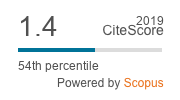Confirmatory factor analysis of the essential digital competencies for undergraduate students in Thai higher education institutions
Abstract
The purpose of this descriptive study was to apply 2nd order confirmatory factor analysis (CFA) and structural relationship models to identify the digital competency components essential to undergraduate students in Thai higher education institutions. The sample comprised 1,126 specialists in Information Technology, Computer Technology, Computer Education, Computer Science, and Computer Engineering working in public higher education instructions throughout the country. The selection was the result of multi-stage random sampling from 76 public higher education instructions that offer undergraduate education. The instrument was a questionnaire form on essential digital competency components for undergraduate students in higher education institutions. The question items employed a 7-point Likert scale and showed Cronbach's alpha values for the content validity and reliability at a range of.93-.97 per domain and .87-.99 per component. The data were analyzed using descriptive statistics for general data and 2nd Order CFA analysis. The findings revealed that from 24 observed variables, there were 7 competency components.: 1) Fundamental of digital ; 2) Accessing digital information; 3) Using digital information; 4) Creating digital information and media; 5) Communicating digital information; 6) Managing digital information; and 7) Evaluating digital information. The discovery from this study was substantially constructive for Thai higher education institutions as it could be used to design an essential digital competency framework of the 21st century.
Keywords
DOI: https://doi.org/10.3926/jotse.645
This work is licensed under a Creative Commons Attribution 4.0 International License
Journal of Technology and Science Education, 2011-2025
Online ISSN: 2013-6374; Print ISSN: 2014-5349; DL: B-2000-2012
Publisher: OmniaScience







